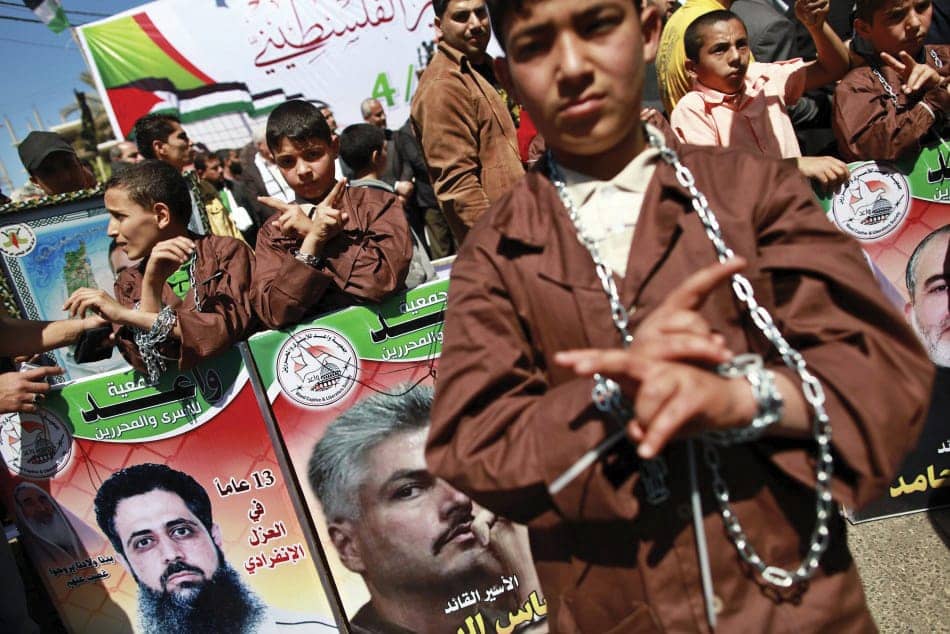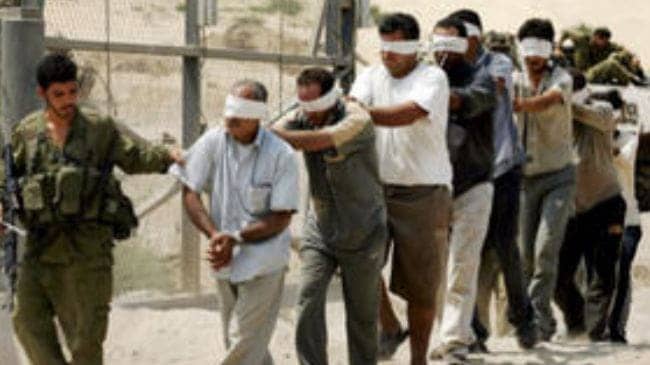by Nora Barrows-Friedman

As part of the agreement, Israel agreed to limit the use of administrative detention indefinite imprisonment without charge or trial and said it would ease years-long harsh restrictions on families, especially from the Gaza Strip, that keep them from visiting their loved ones in Israeli jails. Meanwhile, Palestinian human rights organizations press on with legal and political advocacy for Palestinian prisoners.
On May 18, I interviewed Sahar Francis, director of Addameer, the Palestinian prisoner support and human rights organization. Addameer has been at the forefront of advocacy work and public information about the recent hunger strikes.
Nora Barrows-Friedman: First off, what did this mass hunger strike reveal about Israel’s policies against Palestinian prisoners and their families policies that have been going on for decades inside and outside the prisons?
Sahar Francis: Actually, I think the hunger strikes highlighted the most problematic practices against the prisoners and their families. For example, solitary confinement for long periods as a punishment, like the case of Mahmoud Issa, who spent more than 10 years in isolation; the family visit restrictions and the total banning of families from Gaza since June 2007; the violations that these prisoners face on a daily basis under [harsh] conditions, like the health conditions, [restrictions on] education, the punishments that they face inside the prisons with different [justifications], as well as treatment of the families during visits – for example, the strip searches that the families [have to go through] when they enter the prison to visit.
And of course the policies of administrative detention, the arbitrary detention without charge or trial for long periods – [challenging] this was one of the main demands in this hunger strike.
NBF: Talk about the five provisions that were agreed upon between representatives of the hunger strikers and the Israeli Prison Service. How would you assess the process of coming to that agreement, and what are some of the prisoners with whom Addameer works saying about the agreement?
SF: Actually the agreement was reached after a lot of pressure from the different sides, whether at the local level or the international level. And definitely at the end, I think it was the Egyptian mediation that made this happen [in a practical way] on the ground to agree on the five issues that were demanded by the prisoners. We should highlight that what was published by the Israeli officials was the commitment that the prisoners’ committee – the nine prisoners who represented all of the prisoners who were on hunger strike – signed in the name of the other prisoners.
And according to the report from the members of the prisoners’ committee, the Egyptians were reaching an agreement with the Israelis that first they should stop their hunger strike and secondly that all people in [solitary confinement] would be taken out to the normal sections with the other Palestinian prisoners within 72 hours of signing the agreement.
Thirdly, establishing a special committee within the IPS [Israeli Prison Service] in order to check all the different conditions that prisoners were complaining about, and, of course, the Israelis [agreed] that within one month they would start again with all the family visits from Gaza and to solve the security problems that families from the West Bank were facing. Finally, there was the case of administrative detention.
And here actually there was an argument in the negotiation itself. On the day they signed the agreement, the Israelis were claiming that it would just include the five prisoners who were in Ramle prison the [longer-term] hunger strikers. The prisoners insisted, according to the Egyptian mediator, that no, it was about all the issues of administrative detention [as a whole], and actually what we were told by the prisoners is that the Egyptian mediator insisted that it include the administrative detention as such. …
It means that the Israeli side would restrict the use of administrative detention to very high security cases and not in an arbitrary manner like they were using until today, and that the court would be more effective in its restriction of the extension of administrative detention in the future.
I think they will consider the position of the judge in the case of Bilal [Diab] and Thaer [Halahleh] in the high court about [Israel’s use of] secret [evidence]: how to find a way with another lawyer besides the Palestinian lawyers who would usually represent the administrative detainees – maybe a lawyer from the state’s side who can review the secret files and can defend the detainees as well.
But it’s not yet clear, I don’t think, that there will be a decision about this issue in the near future.
NBF: And, of course, we know that Israel has a long and entrenched history of not abiding by agreements, whether it’s international laws or agreements related to specific cases. How can you assess whether Israel is going to respect the agreements laid out this week related to the hunger strikes?
SF: Actually, the prisoners are well informed that the Egyptian side promised them that they will guarantee and follow the implementation of the agreement. It was reported today [May 18] that the prisoners ended their isolation [in solitary confinement], and we got some information from families of the prisoners who were in isolation that they were moved into the [general prison population].
I think that the issue of isolation is going to be solved within this week. Hopefully, the family visits as well will be solved very soon. But, of course, it should always be monitored and followed very closely in order to get to be sure that they are really committing themselves to the agreement.
Today also we are aware that some of the prisoners have remained on their hunger strike. One prisoner is still on hunger strike because he is demanding prisoner of war status. He was transferred a couple of days ago to Jalameh detention center, and yesterday he was subjected to a physical attack from a policeman there. He’s still on hunger strike, and he’s in [solitary confinement].
So we expect that some violations will take place, and this is why all the human rights NGOs [non-governmental organizations] should be following this very closely.
NBF: What about the legal implications? What is being done to challenge Israel’s use of administrative detention, torture and interrogation? And could one of the effects of this mass hunger strike be that more will be done in the legal venue to challenge and eventually stop these practices?
SF: First, we should be aware that I don’t think it will affect much the use of torture and other methods that are used in interrogation or in the processes of arrest or trial when they transfer the prisoners, because the agreement is not [related] to such specific issues. And this is why we have to keep following and working on the legal level with the case of the prisoners.
The success in this hunger strike doesn’t mean that the problem of the Palestinian political prisoners has reached an end, and they would be now living in perfect conditions, no. As well, the changes with administrative detention, until we get to monitor it on the practical level, we have to wait and see how it would work.

I don’t believe that this is the end of the practice of administrative detention, but I think that a very good point here is that this hunger strike seriously highlighted Israel’s problematic issue of the practice of administrative detention, so in the future we can keep up this pressure especially from the U.N. and other international human rights organizations and political [strategies] on the practice of administrative detention.
Almost everyone was condemning the way that Israel was using it and saying that it contradicts international law and international standards. Although the Fourth Geneva Convention gives an option for the use of administrative detention, it’s very limited and very restricted, and there are guarantees for a fair trial procedure, which Israel violates.
This is why we were getting a lot of support this time during the hunger strikes on the issue of administrative detention.
NBF: This history-making hunger strike mobilized not just communities across Palestine but international solidarity groups as well. And the agreements to end the hunger strike came on the same day of the 64th anniversary of the Nakba. What are your thoughts on how can people around the world in solidarity with the Palestinian struggle keep the issue of Palestinian prisoners at the forefront of activism?
SF: I think that the Israelis were pressured and they wanted to end the hunger strike before Nakba Day [May 15]. This is why the agreement came in the night before the 15th, in order not to have all the attention in the activities on Nakba Day towards the issue of the prisoners. They were afraid that this would cause a lot more tension and activism, especially in the occupied West Bank and Gaza Strip and on the international level.
But I think that the issue of the hunger strike showed that public activism and civil support that all the different groups were giving on the issue of the political prisoners shows that this should be a [sustained movement], and by such struggle we can succeed. This is why we should look at the prisoners’ issue as just one part of the whole. The settlements, the prisoners, the wall, the house demolitions, the checkpoints – all the different aspects of the occupation – should be connected under the kind of civil resistance which includes boycott, divestment and sanctions, demonstrations and other activities like we experienced in the last two months for the support of the hunger strikes.
Nora Barrows-Friedman is an associate editor for The Electronic Intifada, where this story first appeared, and a producer for Flashpoints, broadcast at 5 p.m. weekdays on KPFA. She can be reached at norabf@gmail.com.





